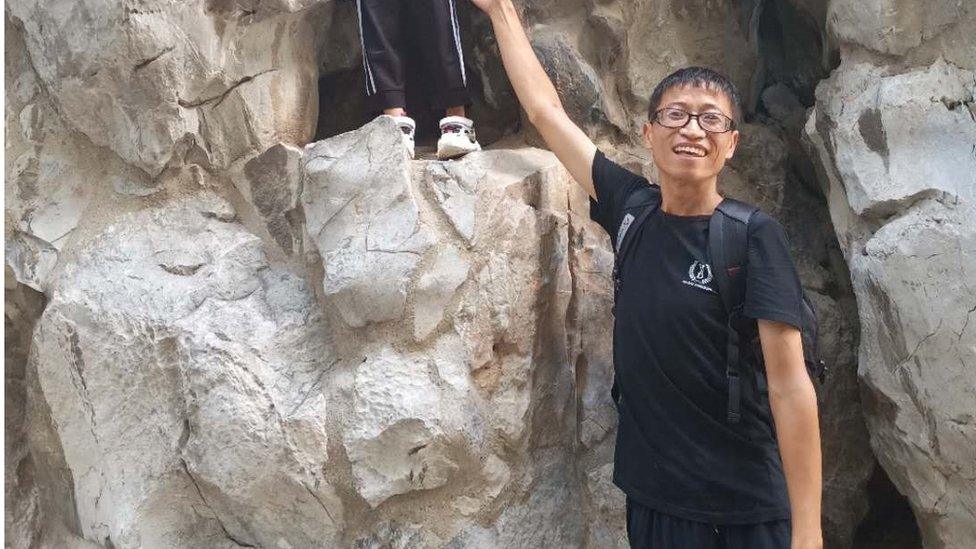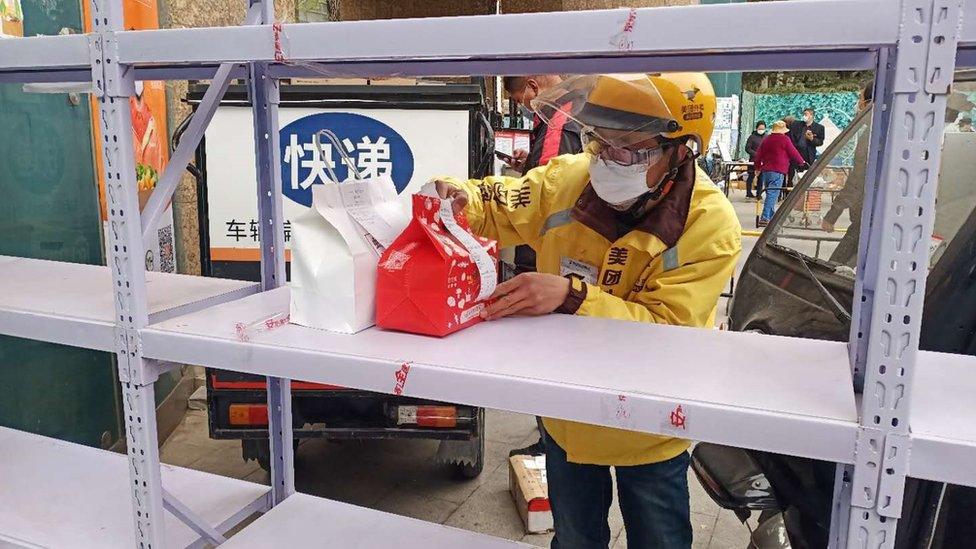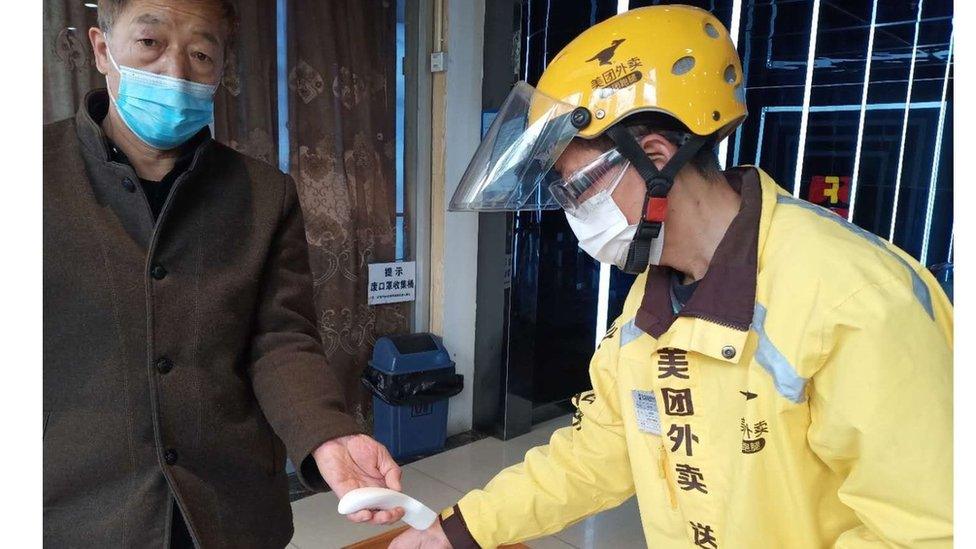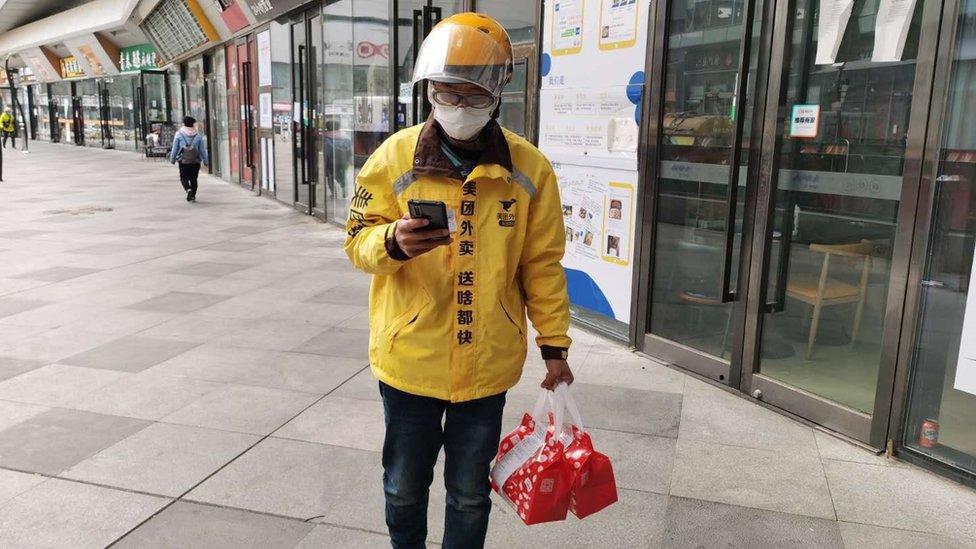Coronavirus: Food delivery driver paying back doctors who saved him
- Published

"Doctors and nurses are people who saved me from cancer and gave me strength in the darkest time. I need to return the favour," says Li Yan, a food delivery rider based in Beijing.
Mr Li was diagnosed with lymph cancer in 2003, when he was just 17 years old. He recovered from the disease and has been full of gratitude ever since for the medical workers who nursed him back to health. With China in a national lockdown, food delivery firms found themselves in hot demand providing meals for residents stuck at home to prevent the spread of the coronavirus.
As a delivery rider for Meituan, one of China's biggest food delivery firms, Mr Li saw an opportunity to repay the medical professionals he admires by providing them with food and drinks as they worked tirelessly on patients across the city. "Given my past experience, I felt I needed to do something for them in return during the virus outbreak," he adds.
Beijing is a city of 21 million residents, and Mr Li covers its Tongzhou district, where there are a handful of hospitals with fever clinics, one of which is a designated hospital for Covid-19 treatment. "Many might have concerns delivering for the hospital, but I've chosen to deliver for them more often. I just think of the local residents and medical workers who need us. I can't leave them being hungry. It's not for money."
Before the outbreak in China, he delivered more than 50 orders on an average day. But during the first ten days after the coronavirus outbreak in late January, the number of orders dropped to less than 20, as some restaurants were closed. The outbreak also coincided with the Chinese New Year period which is normally a low season.
"By mid-February when the situation was brought more under control, and people's concerns and fears gradually began to ease, orders started to be restored. I can deliver over 40 orders a day now."

During this time, Meituan brought in a contactless delivery option which allowed food to be dropped off at designated points to avoid contact between customers and riders. "When I called customers to explain, some initially didn't understand and wanted to cancel the order. But gradually people grew more understanding and began to welcome the contactless approach."
Empty streets
China was in lockdown for more than two months, although restrictions are now beginning to be lifted. It will still take time before a sense of normalcy returns.
"I remember when the coronavirus first broke out, it was hazy for a few days in Beijing. Streets were empty and stores were closed. An ambulance or a delivery rider occasionally drove by. It felt like I was living in a different world."
Mr Li says restaurants have started to re-open and people have begun coming back to work in the office since mid-February. Orders are still lower than normal but are improving.
"I miss the hustling Beijing which used to filled with traffic, the days when I could smell car exhaust when I stop at crossroads, the times when I had to walk all the way up to the 6th floor to deliver food, and even times when I was late for a delivery."

When the virus first broke out, face masks and alcohol disinfectant were the most ordered items along with supermarket groceries. "Grains, rice, cooking oil, vegetables, fruits, and solid, packaged food that lasts long. Orders often came in big sizes and transaction prices at around 200 yuan [£23; $28] to 300 yuan on one order."
Being a food delivery rider, Mr Li feels he can not only give back to the medical community but to the city's vulnerable too.
"I once received an order that came with a note saying the customer is a 82-year-old who lives alone and couldn't get downstairs to pick up the food so the rider needs to enter the residential community and deliver food to the door. I had to spend some time communicating with security and finally was allowed in. The door was open when I arrived, and I put the bowl of wontons [a type of dumpling] on the table."
Tips have increased from happy customers during the pandemic as a result. "Many more send me thank-you notes in the Meituan app and tell me to take care."

Keeping clean
Mr Li has a new routine now which involves lots of disinfecting and temperature checks. "I get my temperature checked dozens of times everyday now, before entering shopping malls, at restaurants, and returning home to the residential compound I live in. I also bring with me disinfectant sprays, a towel in my scooter and use disposable gloves when delivering to areas with reported confirmed cases."
While he's providing a vital service, is Mr Li worried about the risk of infection? "I did have worries when the virus spread and was at its worst time here but I feel like I've already been there, given what I went through in the fight against cancer.
"I've learnt to take things easy, look at the bright side of things and always seek strength in a dark time. As long as I take sufficient precautions, masks, gloves, disinfectants and everything, and follow advice from disease control experts, I think the possibility of getting the virus is pretty low."
And with a seven-month pregnant wife at home, Mr Li is looking forward to happier times.

A SIMPLE GUIDE: How do I protect myself?
AVOIDING CONTACT: Rules on self-isolation and exercise
HOPE AND LOSS: Your coronavirus stories
VIDEO: The 20-second hand wash
